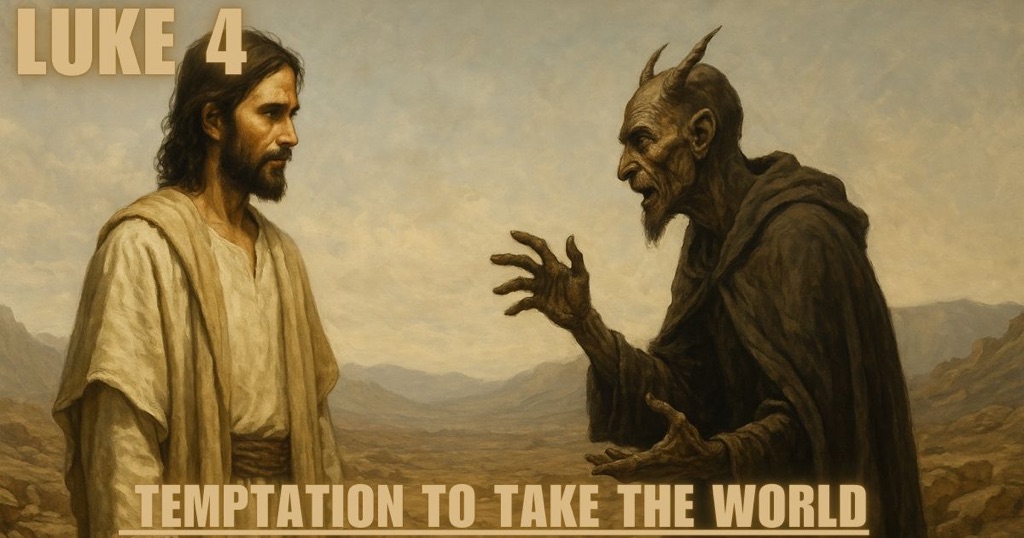There’s something particularly jarring about being misunderstood by the people who know you best. That’s what happens to Jesus in Luke 4. After emerging from the wilderness filled with the Spirit, He returns to His hometown only to be rejected by those who watched Him grow up. But this isn’t just a story of rejection—it’s one of bold declarations, unwavering resolve, and an invitation to all people, not just a chosen few. Luke 4 holds transformative lessons that still hit home today.
Temptation and Strength in the Wilderness
Jesus’ public ministry begins in private hardship. After His baptism, He is led by the Spirit into the wilderness, a barren and harsh place where He fasts for forty days. This isn’t just about enduring hunger—it’s a powerful act of spiritual discipline and dependence on God.
Satan tempts Him three times:
- Physical need: Turn stones to bread. Jesus replies, “Man does not live by bread alone.” He chooses spiritual sustenance over physical comfort.
- Power: Bow and rule all kingdoms. Jesus refuses, declaring allegiance only to God.
- Glory: Prove yourself with a miracle. Again, He declines, resisting the temptation to perform for fame.
Each temptation speaks to desires we all wrestle with—comfort, power, recognition. Jesus’ resistance shows a roadmap for how to respond: know your purpose, rely on God’s truth, and refuse shortcuts that compromise integrity.
The Hometown Hero Turned Outcast
Things escalate when Jesus returns to Nazareth. At first, He’s welcomed with interest. But in the synagogue, He reads from Isaiah: “The Spirit of the Lord is upon me…to proclaim good news to the poor…freedom for the oppressed.” Then He says, “Today this scripture is fulfilled in your hearing.”
Everyone is stunned. Not because it’s unfamiliar, but because He claims to be the fulfillment of the prophecy. They murmur, “Isn’t this Joseph’s son?” Their familiarity blinds them. They wanted miracles, not a mission. They wanted confirmation of their expectations, not confrontation with truth.
Jesus doesn’t soften the message. He reminds them that in the time of Elijah and Elisha, God’s miracles were given not to Israelites, but to Gentiles—outsiders. This enrages the crowd. The idea that God’s blessing is for everyone—not just “us”—is too much. They try to throw Him off a cliff. Instead, He walks away untouched.
The Radical Message: God’s Kingdom is for All
This moment defines Jesus’ ministry. He’s not just offering comfort to insiders; He’s announcing freedom for all. The poor, the blind, the captive, the oppressed—regardless of nationality, background, or past. God’s salvation will not be confined to borders or bloodlines. That’s the beauty and scandal of grace.
Power Over Evil, Healing for the Broken
After leaving Nazareth, Jesus continues teaching in Capernaum, where He casts out a demon in a synagogue. The demon, recognizing who He is, says, “You are the Holy One of God.” Jesus commands silence and authority. He heals Peter’s mother-in-law and later many others. These aren’t just acts of compassion; they’re declarations that God’s kingdom is arriving.
Even the demons know who Jesus is, but He silences them. It’s not time for the full truth to be revealed—not by the mouths of evil spirits. Jesus remains in control, choosing when and how His identity will be made known.
When Grace Offends: Lessons from Nazareth
One of the most compelling aspects of this chapter is how offended people get when grace includes those they didn’t expect. The people of Nazareth were okay with Jesus being powerful, as long as that power served them. When it extended beyond them, they were furious.
This should challenge us. Are there people we unconsciously think don’t deserve God’s mercy? Are there boundaries we’ve drawn around grace that Jesus never drew? Luke 4 forces us to examine those heart postures.
Takeaways for Today
- Familiarity can breed resistance: Just because we think we know Jesus doesn’t mean we always recognize what He’s doing in our lives.
- God’s grace is for everyone: Not just people like us, or people we think have earned it.
- Temptation is real, but resistible: Jesus faced real struggles and shows us we’re not alone in ours.
- Authority comes from alignment with purpose: Jesus didn’t wield power recklessly—He used it in alignment with His mission.
Conclusion: A Savior Who Shocks and Saves
Luke 4 shows us that Jesus wasn’t just a wise teacher—He was a disruptor of expectations. He came with a message of liberation, but also one that would offend those who wanted to keep salvation exclusive. Whether facing temptation, rejection, or spiritual opposition, He stayed rooted in His mission. And that mission? To bring good news to the poor, liberty to the captive, and healing to all who are broken—then and now.

